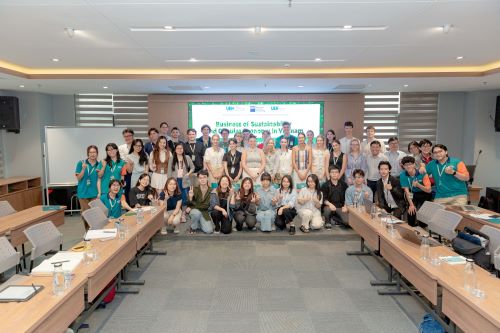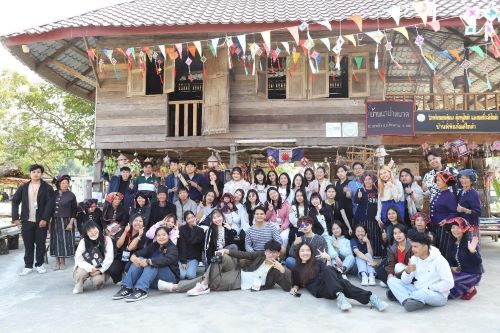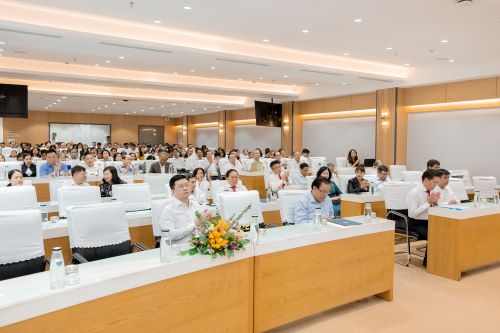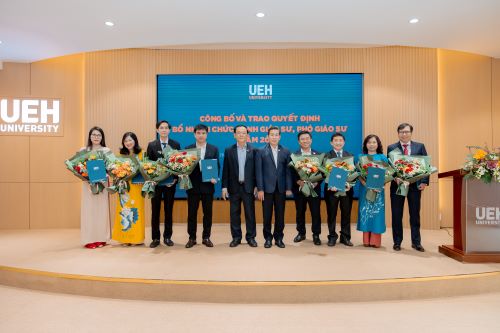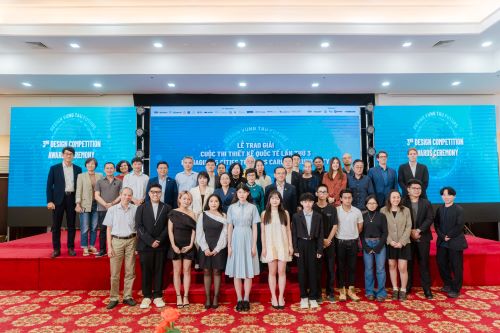Special discussion session No. 7: "Economic Policy Uncertainty" with Vietnamese Academic Network in Japan
Recently, UEH College of Business (COB) in collaboration with the Vietnamese Academic Network in Japan (VANJ) held the 7th special discussion session on "Economic Policy Uncertainty", part of the VANJ 2022 Seminar "Diversifying for an inclusive society”. The seminar was successfully held with more than 50 speakers, nearly 100 participants at the Hall of The University of Tokyo, more than 300 people online on the Zoom/livestream platform, and several broadcast bridges at universities in Vietnam.
Attending the seminar, on the side of UEH representatives, there were: Assoc.Prof.Dr. Bui Thanh Trang - Vice Rector of UEH College of Business (COB); Dr. Nguyen Thi Hong Thu - Vice Dean of School of International Business - Marketing; Dr. Hoang Cuu Long - Vice Dean of Faculty of International Business - Marketing; with UEH lecturers and students.
The seminar had the participation of speakers including Mr. Chikahisa Sumi - Director of the Regional Office for Asia and the Pacific, International Monetary Fund (IMF); Mr. Kazunobu Hayakawa - Center for Developing Countries Research in Thailand; Dr. Do Thi Hai Ninh - Lecturer at UEH College of Business; Dr. Nguyen Bich Ngoc - Lecturer at National Economics University.
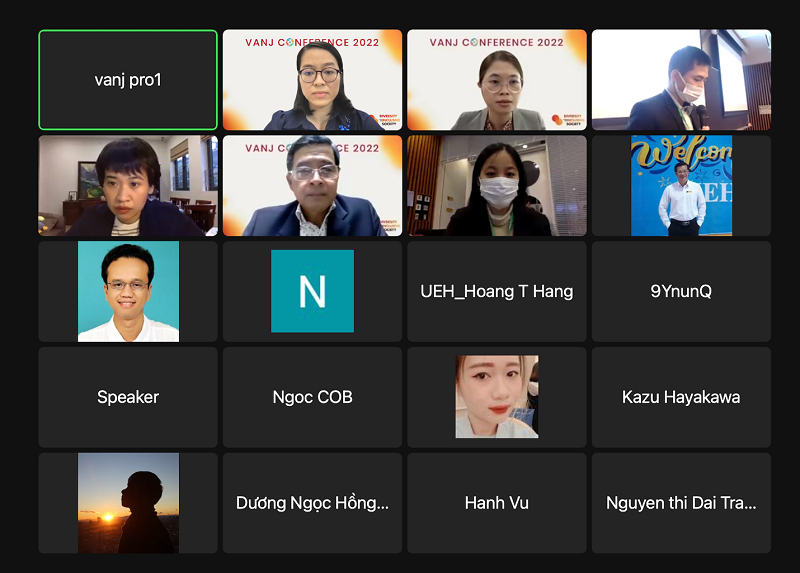
Assoc.Prof.Dr. Bui Thanh Trang and UEH lecturers and students participated from the beginning of the Vietnamese bridge
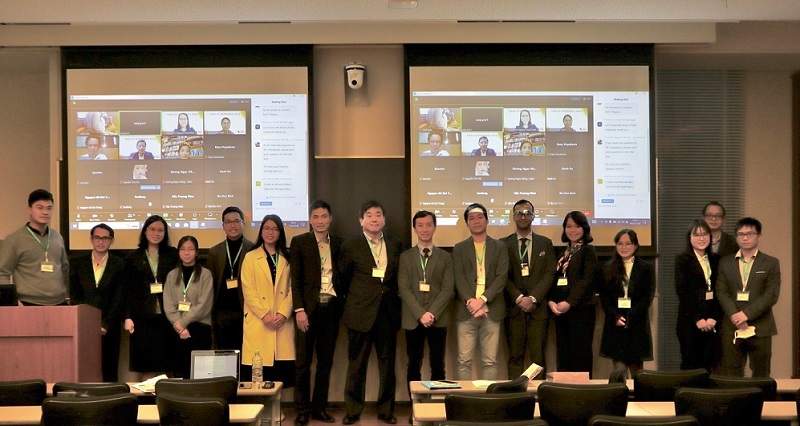
Speakers attending the conference
At the beginning of the discussion session, Mr. Chikahisa Sumi - Director of the Regional Office for Asia and the Pacific, International Monetary Fund (IMF) delivered a speech on “World Economic Outlook: Inflation and Uncertainty". The slowdown in global economic activity was broader and stronger than expected, with inflation higher than levels seen in decades. The economic outlook depends on the successful adjustment of fiscal and monetary policies. The evolution of the war in Ukraine and growth prospects in China. Risks are still unusually large: monetary policy may miscalculate stance to reduce inflation; different policy lines in the largest economies could exacerbate the appreciation of the US dollar; global financial tightening could cause debt distress in emerging markets; and the worsening of China's real estate sector crisis could undermine growth. Policymakers should focus on restoring price stability and easing cost-of-living pressures. Multilateral cooperation is still needed to accelerate the green energy transition.
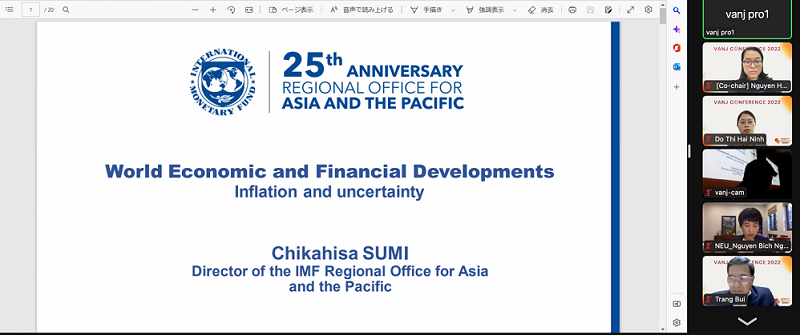
Mr. Chikahisa Sumi shared on “World Economic Outlook: Inflation and Uncertainty”
Next, Mr. Kazunobu Hayakawa - Center for Developing Countries Research in Thailand, shared the Impact of the US-China trade conflict in Southeast Asia. The study examines the effects of the US-China tariff war on exports to the US in Southeast Asian countries and their imports from China. To do that, the study estimates different equations for monthly trade between January 2018 and December 2019. The results indicate that a number of Southeast Asian countries have increased exports to the United States. Some countries increase their imports from China. Most countries experienced increased exports to the United States or imports from China. Exceptions include Cambodia and Vietnam, which both increase. In particular, some evidence has been found suggesting that products made in China are re-exported to the United States through Vietnam in order to evade tariffs imposed by the United States on China.
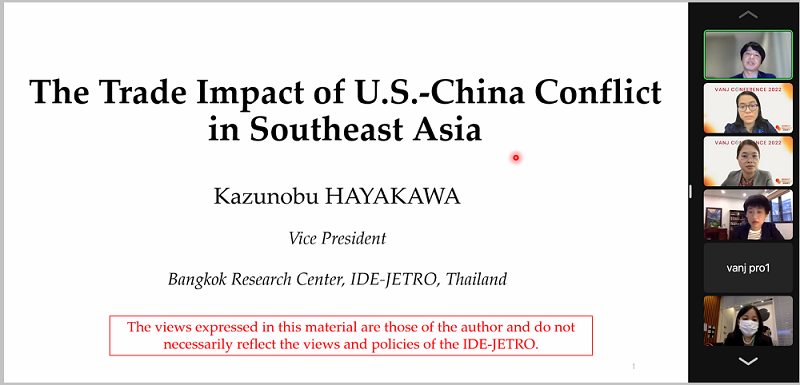
Mr. Kazunobu Hayakawa shared about the Impact of the US-China trade conflict in Southeast Asia
Dr. Do Thi Hai Ninh - Lecturer at UEH UEH College of Business, conducted a study on "The impact of innovation factors on the performance of small and medium enterprises in Vietnam during the Covid-19 period". Based on 450 valid responses from senior employees, managers, and senior executives of Vietnamese enterprises, the study examined the role of mediating organizational resilience and the resilience of business networks on the relationship between co-innovation and performance of small and medium-sized enterprises (SMEs) as well as examining the regulatory effects of the impact of Covid-19 in the context of a single emerging market. The results of the study show that there is a significant and favorable relationship between innovation and SME performance. This result implies that innovation can improve the performance of small and medium enterprises.
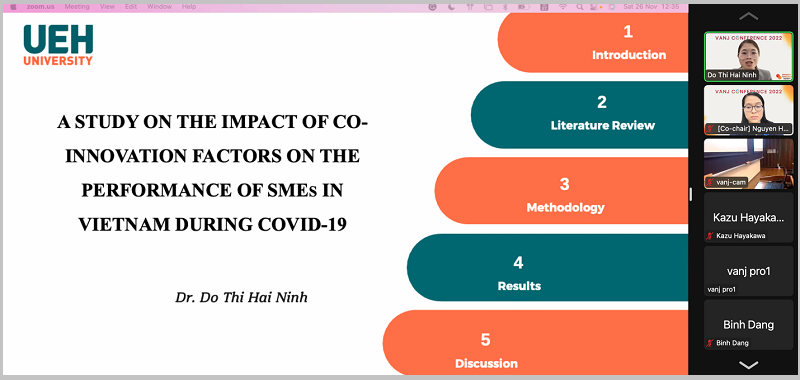
Dr. Do Thi Hai Ninh shared about “Impact of innovation factors on the performance of small and medium enterprises in Vietnam during the Covid-19 period.”
Finally, Dr. Nguyen Bich Ngoc - Lecturer of National Economics University, shared a study on "The heterogeneous impact of non-tariff technical measures on imported agricultural products of Vietnam". The sharing points out the growing importance of non-tariff measures (NTMs), especially technical ones, in today's international trade, posing challenges for many countries, especially Least Developed Countries (LDCs), to promote international trade. This study examines the impact of non-tariff technical measures, especially Phytosanitary (SPS) measures and Technical Barriers to Trade (TBT) measures imposed by Vietnam Government on imported agricultural products. The paper shows that, although very complex measures tend to have a negative impact on imports from LDCs, they have a positive effect on imports from non-LDCs. Interestingly, technical non-tariff measures positively affect imports from LDCs. The paper also shows that the facilitation effect of extensive trade agreements on member countries' compliance with technical non-tariff measures is very limited.
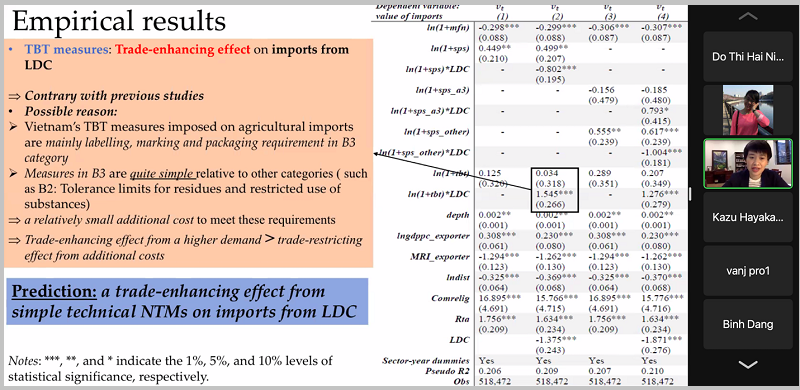
Dr. Nguyen Bich Ngoc shared her research on "The heterogeneous impact of non-tariff technical measures on imported agricultural products of Vietnam"
With an open atmosphere, the guests shared up-to-date scientific information. Discussion sessions were lively and attracted the interest of many researchers.
News, photos: COB General Department

